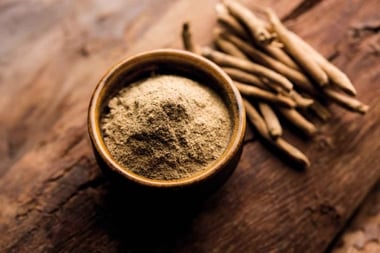Cooking with Healthy Fats and Oils

Many people avoid fat at all costs, but our bodies need healthy fats. They can reduce inflammation, increase energy, and improve cognitive function.
Amber Baker, CNP, RNCP, is a nutritionist at InspireHealth Lower Mainland in Vancouver, BC. inspirehealth.ca
Cooking with healthy fats and oils
Fat has become a scary word and many people feel they should be avoiding it at all costs. While highly processed or chemical-ladened fats and oils do increase the risk of disease, minimally processed and organically produced fats are an essential component to a healthful diet.
Every human cell is contained by a fat membrane. Vitamins A, D, E, and K all require fat to be absorbed and assimilated, and our brain depends on fat to communicate with the rest of our body—talk about essential! Healthy fats can reduce inflammation and cholesterol, increase energy, and improve cognitive function too.
However, it can be hard to determine which ones are the best to include and why. Fats and oils are extremely sensitive and will begin to oxidize when exposed to heat, oxygen, or light. Oxidation is the series of chemical reactions that degrades the quality of oil and eventually produces a harmful, rancid fat. To slow this breakdown, it’s best to keep fats and oils in sealed, dark glass bottles in a cool cupboard or fridge.
What fats are beneficial?
Olive oil contains high amounts of antioxidants including vitamin E, which naturally protect the oil and the cardiovascular system from oxidative damage. A monounsaturated fat, olive oil is liquid at room temperature and very sensitive to heat. It’s best used to make salad dressing or to cook with on low heat.
Organic grass-fed butter is a wonderful fat to include in your diet. Grass-fed butter is higher in omega-3 fats compared to conventionally raised butter. Omega-3 fatty acids are well-known for their anti-inflammatory action that can improve blood fluidity and prevent the occurrence of some cancers. Organic grass-fed butter is made up primarily of saturated fats, which are very heat tolerant and stable. This makes grass-fed butter a better fat to use when cooking at higher temperatures compared to unsaturated fats.
Coconut oil is also a saturated fat and made up of medium-chained triglycerides (MCTs). Unlike animal fats, which are long-chained, coconut oil can easily enter the energy-producing organelles in cells. The body actually prefers to use MCTs as energy rather than store them as body fat. Coconut oil is a great option for cooking at higher heats too.
Buying oils
Look for these key words when shopping for oils:
Certified organic
Toxins and chemicals bioaccumulate in fat, which is why it’s very important to buy organically raised meats and oils. Many chemicals are used in commercial oil preparation. If you’re buying organic, then you know your oil has avoided these added steps.
Unrefined
When oils are refined, they may be mixed with a harmful chemical base. Nutrients and minerals are lost during this step of processing. So stick with unrefined!
Cold Pressed
The temperature at which oil is extracted depends on the hardness of the nut or seed shell. The harder the nut, the more heat that is created through processing, which can cause further oxidative damage to the oil. Cold pressed oils have been extracted in cool, temperature-controlled environments so the oil preserves its beneficial properties.
Extra-Virgin
If you’re not able to buy organic, look for the extra-virgin labelling to find a higher quality product. Extra-virgin olive oil must be produced by mechanical means and cannot reach temperatures higher than 30 C (86 F). The oil must also be below the chemical thresholds, which the International Olive Council tests before allowing the designation.
Follow these tips:
- steer clear of cheap, processed oils
- shop for high quality products that you’ll use less often
- stick to low heat while cooking
- use olive oil for dressings, to finish dishes after cooking, or for cooking on low heat
Bon appétit!




